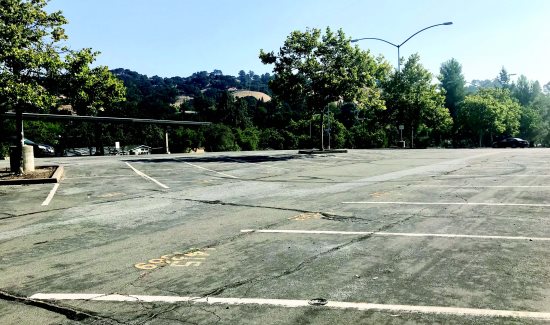 | | | Will the BART parking lot, empty at weekends and full during the week, be the site of transit-oriented development in the future? Photo Pippa Fisher | | | | | | The controversial BART bill, proposing dense residential construction on BART-owned land, came a step closer to reality Aug. 16, with a 5-2 vote for the bill from the Senate Appropriations Committee. Now the bill is heading for a full senate floor vote within the next two weeks in order to be on the governor's desk by Sept. 1.
 While no one denies the need for increased housing in the Bay Area, every mayor in the county's 19 cities registered their objection to the proposal with their signatures on a letter of opposition. At issue are concerns over lack of local government control.
While no one denies the need for increased housing in the Bay Area, every mayor in the county's 19 cities registered their objection to the proposal with their signatures on a letter of opposition. At issue are concerns over lack of local government control.
 Assembly Bill 2923, sponsored by Assembly Members David Chiu and Timothy Grayson, as initially written would hand control and regulations to BART to adopt transit-oriented development on BART-owned land within a half-mile radius around stations, which calls for a minimum height of five stories and a minimum density of 75 housing units per acre.
Assembly Bill 2923, sponsored by Assembly Members David Chiu and Timothy Grayson, as initially written would hand control and regulations to BART to adopt transit-oriented development on BART-owned land within a half-mile radius around stations, which calls for a minimum height of five stories and a minimum density of 75 housing units per acre.
 Although it is understood that some amendments were made to allow for density bonuses and to include a section about consultation, specific details were not available when this article was written.
Although it is understood that some amendments were made to allow for density bonuses and to include a section about consultation, specific details were not available when this article was written.
 Lafayette Mayor Don Tatzin was disappointed by the Appropriations Committee vote. "Cities are approving transit-oriented development without the bill and sometimes without BART," he said. "The bill sets a dangerous precedent for other special districts to start setting land use policies."
Lafayette Mayor Don Tatzin was disappointed by the Appropriations Committee vote. "Cities are approving transit-oriented development without the bill and sometimes without BART," he said. "The bill sets a dangerous precedent for other special districts to start setting land use policies."
 The news was welcomed however by Nonprofit Housing Association Policy Director Michael Lane.
The news was welcomed however by Nonprofit Housing Association Policy Director Michael Lane.
 "We are pleased the bill has been sent to the Senate floor for a vote and have agreed to major concessions and amendments to the bill in response to concerns raised by our local elected officials to ensure all planned developments on BART property blend in well with existing neighborhood building heights and densities and conform to the locally-adopted design and architectural standards," said Lane, adding, "Final permitting authority remains with the local government. We are absolutely committed to being good and respectful neighbors."
"We are pleased the bill has been sent to the Senate floor for a vote and have agreed to major concessions and amendments to the bill in response to concerns raised by our local elected officials to ensure all planned developments on BART property blend in well with existing neighborhood building heights and densities and conform to the locally-adopted design and architectural standards," said Lane, adding, "Final permitting authority remains with the local government. We are absolutely committed to being good and respectful neighbors."
 Lafayette Vice Mayor Cam Burks described the vote in favor of AB 2923 as a significant blow to local governance democracy in California.
Lafayette Vice Mayor Cam Burks described the vote in favor of AB 2923 as a significant blow to local governance democracy in California.
 "While I haven't seen the new amendments, I'm profoundly disappointed in the committee for not hitting pause and hope that the full senate will exercise common sense in the coming days to vote down this bill," he said.
"While I haven't seen the new amendments, I'm profoundly disappointed in the committee for not hitting pause and hope that the full senate will exercise common sense in the coming days to vote down this bill," he said.
 Burks said that cities across the Bay Area, and all over the state, are against this legislation, which strips local land use, zoning and development control and places it into the hands of a "largely dysfunctional transit agency." He stressed he was proud of residents who had sent "a tsunami" of emails and letters.
Burks said that cities across the Bay Area, and all over the state, are against this legislation, which strips local land use, zoning and development control and places it into the hands of a "largely dysfunctional transit agency." He stressed he was proud of residents who had sent "a tsunami" of emails and letters.
 "I will continue to directly engage Sacramento and elected officials all over California in the coming days in an attempt to stop this bill from moving forward," Burks said.
"I will continue to directly engage Sacramento and elected officials all over California in the coming days in an attempt to stop this bill from moving forward," Burks said.


|
